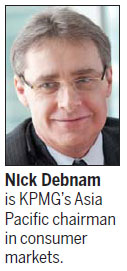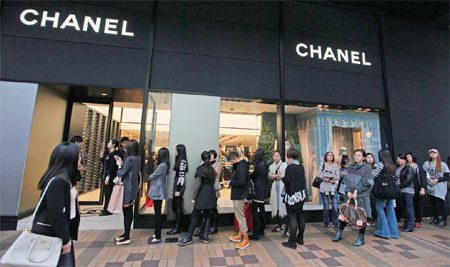Shopping elsewhere
Updated: 2013-02-01 08:56
By Lv Chang, Gao Changxin, Lin Jing and Chen Yingqun (China Daily)
|
||||||||
|
Shoppers from the Chinese mainland line up to buy Chanel products in Hong Kong. Provided to China Daily |

As prices of luxury items remain prohibitive in China, affluent consumers rack up sprees abroad
Wang Zhikuan, a 45-year-old man from Jilin province, is on one of his typical sprees. At Paris' Galeries Lafayette, an upper crust department store known in China as the "land of luxury goods", Wang is showing a shop assistant his laptop where he saved a photo of a Chanel bag that his friend wants him to buy.
"The price is good here," says Wang, who works for a media corporation in Beijing. "My friend made it clear about what she wants because it is an exclusive product that she can't find in China."
This is one of several trips he'll take to Europe, specifically Paris, this year for both work and leisure. Each time, he spends tens of thousands of yuan shopping.
In what is close to sounding like a broken record, Wang and other affluent Chinese tourists, flaunting bags adorned with oversized logos from high-end brands such as Prada, Hermes and Louis Vuitton, are scouring the global havens of shopping such as Hong Kong, London, New York City and Paris for the latest and hottest in luxury goods.
Related reading: Old is the new new
During one recent afternoon in Paris, bystanders at Galeries Lafayette looked on seemingly in shock at the number of Chinese tourists running from one luxury store to the next.
This is quickly becoming a common occurrence for wealthy Chinese shoppers, especially during Chinese New Year early in the year or National Day in October. Both holidays last for at least a week in China, which turns shopping sprees into multi-day affairs.
But as the number of outbound Chinese shoppers increases, more are foregoing the domestic market for their purchases of luxury items.
A recent Bain report says a weaker euro coupled with an increasing number of Chinese tourists traveling abroad have pushed Chinese shoppers to make 60 percent of their total luxury purchases outside Chinese mainland.
On Jan 22, according to an annual KPMG report, overseas travel among Chinese rose 71 percent in 2012, compared to a 53-percent increase in 2008. Seventy-two percent of them said they purchased luxury items during their overseas trips, with cosmetics, watches and bags the most popular items.
Zhou Mi, a Chinese-speaking assistant for Chlo, a French fashion brand, says that 80 percent of her customers are Chinese, who, like the wind, come fast and leave fast with a handful of shopping bags.
"Most of them don't really have a budget," she says. "They have no problem with buying three to four pieces at a time."
Sales to Chinese tourists shopping overseas have grown 31 percent, according to the KPMG report, which accounts for nearly a quarter of luxury purchases around the world.
One of the main reasons is the high price of luxury goods in Chinese mainland - many retail at prices 30 percent higher in Chinese mainland than in Europe because of high tariffs on imported luxury goods. For example, a Hermes Birkin bag can be purchased at a 25-percent discount if it's purchased overseas.
The rise of individual tourism among wealthy Chinese is another key trend. Nick Debnam, KPMG's Asia Pacific chairman in consumer markets, says global brands need to pay attention to China's luxury consumers now more than ever.
"What we are now seeing is that the brands which are well positioned in China are receiving a boost in overseas markets from the emergence of a surging new class of traveling and well-off Chinese consumers," he says.
Besides avoiding the high prices for luxury items in China, many affluent Chinese, say analysts, are attracted to the experience of a shopping spree. According to a report by CLSA, a Hong Kong-based brokerage, there is a wider selection in the luxury item's country of origin. There also may be limited editions overseas for special occasions such as Valentine's Day or Christmas. Hermes in China, for example, does not have a central buyer, so their product offerings vary from store to store.
As many affluent Chinese change their shopping behaviors, they are also expecting more in terms of customer service in stores. Both Bain and CLSA point to the fact that global luxury brands need to adjust their marketing approach in China or face the prospect of not being able to keep up with the demands of the Chinese consumer.
Debnam from KPMG says that brands need a global strategy for Chinese consumers both internationally and locally.
"This means you will need a strong market position within China," Debnam says. "They also need the right product offering available in international stores."
Sage Brennan, co-founder of China Luxury Network, a forum for China's luxury sector, says "reaching the Chinese consumer is not just about launching retail locations in China".
"Chinese consumers have gone global and they expect brands to recognize their preferences and treat them appropriately," he says.
To give consumers in China the same experience as in France and Italy, some luxury brands are tapping into in-store impulses for China's biggest spenders, offering them exclusive perks, such as custom-made products or once-in-a-lifetime experiences.
According to the Wall Street Journal, Louis Vuitton recently took 10 of its most valued Chinese clients to Mongolia for a helicopter tour, landing at various luxury resorts to watch private camel-polo tournaments.
The French luxury giant is planning more similar events to "provide an experience to customers that they wouldn't necessarily think of", a company spokesman says.
In July, it opened the doors to a four-story Shanghai outlet equipped with an apartment for private client events and a parlor where VIPs can custom-design their own bags and leather shoes.
Wang Qifei, a 28-year-old fashion lover who says she flies to Hong Kong for some shopping whenever she gets bored, says she receives special gifts and greeting cards from Chanel on her birthdays. Wang, who works as the general manager of her father's insurance company in Beijing, is among the capital's wealthy second generation, who spend extravagantly on luxuries such as cars and cosmetics.
Many wealthy Chinese people say that it's not enough to be rich and that they want VIP services, such as having the owner of the most expensive restaurant in town personally serving them.
Zhou Ting, executive director at the luxury goods and services research center at the University of International Business and Economics in Beijing, says for luxury companies, marketing efforts such as sending handwritten cards, arranging invitation-only events and recognizing who the big spenders are in their stores are required to win these customers' loyalty.
"Chinese customers like to receive gifts and text messages from luxury boutiques," she says. "It is not about the gift, but about how important and special you are, even to luxury companies that are already serving the most elite."
Chinese consumers say they also like to associate themselves with a specific luxury brand. The CLSA report finds that approximately 24 percent of its respondents earn around 41,976 yuan ($6,746; 4,970 euros) per year but would be willing to spend more than 50,000 yuan on a watch.
"It is a lot more important to dress well and enjoy a luxurious life when you are out in public," the report concludes about its survey takers.
But the rise of Chinese outbound travelers also reflects a profound shift in the taste of Chinese luxury consumers. As they have become more sophisticated through traveling, some are starting to avoid logo-heavy products such as Louis Vuitton and Gucci.
"Many consumers are now preferring to keep a low profile and shy away from flashy displays of wealth," Zhou says. "It is not about the logo any more. They want something unique and designed for them to express themselves."
But to give customers what they want, a global consistency in pricing is needed.
Pascal Armoudom, an expert with A.T. Kearney Management Consulting Co Ltd in Shanghai, says it is important to maintain a global price consistency to avoid having Chinese shoppers feel too frustrated when they see varying prices in different locations.
"But this need for consistency can also affect profit if there is a need for change today," he says.
Contact the writers through lvchang@chinadaily.com.cn
(China Daily 02/01/2013 page10)

 Li Na on Time cover, makes influential 100 list
Li Na on Time cover, makes influential 100 list
 FBI releases photos of 2 Boston bombings suspects
FBI releases photos of 2 Boston bombings suspects
 World's wackiest hairstyles
World's wackiest hairstyles
 Sandstorms strike Northwest China
Sandstorms strike Northwest China
 Never-seen photos of Madonna on display
Never-seen photos of Madonna on display
 H7N9 outbreak linked to waterfowl migration
H7N9 outbreak linked to waterfowl migration
 Dozens feared dead in Texas plant blast
Dozens feared dead in Texas plant blast
 Venezuelan court rules out manual votes counting
Venezuelan court rules out manual votes counting
Most Viewed
Editor's Picks

|

|

|

|

|

|
Today's Top News
Boston bombing suspect reported cornered on boat
7.0-magnitude quake hits Sichuan
Cross-talk artist helps to spread the word
'Green' awareness levels drop in Beijing
Palace Museum spruces up
First couple on Time's list of most influential
H7N9 flu transmission studied
Trading channels 'need to broaden'
US Weekly

|

|








